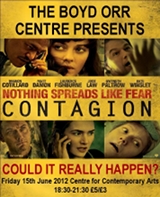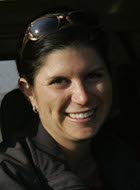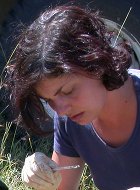The Boyd Orr Centre at the Glasgow Science Festival 2012 |
|
Prof. Rowland KaoStudy finds first direct evidence of tuberculosis transmission between cattle and badgers |
|
Science Sunday10th June 2012 10:00-16:00 Science Sunday is a family friendly interactive event open to the general public that takes place annually within the University Of Glasgow as part of the Glasgow Science Festival. This year, the Boyd Orr Centre is partaking in Science Sunday to explore the science that goes on at the Centre, and let the general public know of the real-life impact the research completed within the centre has on the health of animal and human populations, all through the mediums of art, computer games and quizzes! A group of researchers from the centre will be available to explain such aspects as the relevancy of sneezing computer game to the research done within the Boyd Orr Centre as well as to discuss some of their own research. With something to keep all ages entertained, this event provides an excellent opportunity to introduce the whole family to the research done within the University of Glasgow. |
 |
Contagion: Could it really happen?15th June 2012, 18:30-21:00 We’ve all heard stories about vicious viruses and bad bacteria, and it often seems that there is a new story every week about a new disease or outbreak that could be the end to us all. We are both horrified and fascinated by this, and the movies have responded with blockbuster thrillers such as Outbreak and 28 Days Later. But there is no need for movies to fuel our imagination of a global killer. In the last decade, rapid worldwide spread of deadly infectious agents has been shown to be possible with the emergence of new diseases such as SARS, Bird Flu and Swine Flu. However, none have resulted in the Armageddon scenarios beloved by Hollywood. This leaves us wondering: Is it only a matter of time before we’re out-smarted by a virus? Could an infectious disease really wipe out the human race? As part of the Glasgow Science Festival 2012, the Boyd Orr Centre is hosting a screening of the 2011 star-studded blockbuster movie Contagion along with a question and answer session with a panel of experts in infectious diseases based within the centre. Come along to discover if Hollywood can tell an accurate and scientifically possible story and learn about the research done in Glasgow to understand, investigate and stop such real-life infectious disease outbreaks. For further information on either of these events, please contact Cat O’Connor (0141 330 6615 or c.oconnor@vet.gla.ac.uk) |
 |
Katie Hampson wins prestigious young investigator awardDr. Katie Hampson, a principal investigator in the Boyd Orr Centre, was recently awarded the 2011 Nexxus Young Life Scientist of the Year award. Further details to be found here. |
|
Funding from the Scottish GovernmentThe Boyd Orr Centre has received funding from the Scottish Government, as part of the Scottish Centre of Expertise in Animal Disease Outbreaks. The text of the government press release can be found here. |
|
4 year PhD programme in Virus ResearchThe MRC Centre for Virus Research at the University of Glasgow is now advertising 4 year PhD studentships to start in October 2012. Several members of the Boyd Orr Centre are also linked to the programme. For further information, please follow the link. |
|
Two new research assistant/associate positions in the Boyd Orr CentreTwo new positions have recently come open — each is funded for three years, with possible additional funding for one or two years beyond that. Click on the following links for further details: http://www.jobs.ac.uk/job/ADE180/research-assistant/ |
|
Boyd Orr Centre Open Day - 5th & 6th May 2011We were pleased to announce the first Boyd Orr Centre Open Day, on the afternoon of May 5th and morning of the 6th 2011. The overall theme was 'From Pathogens to Populations'. The event was a mix of talks from both internal and external speakers on subjects relevant to the Centre's mission, a poster session highlighting research at the Centre, and a range of carefully chosen social activities. Confirmed external speakers included: Jamie Lloyd-Smith, UCLA (http://www.eeb.ucla.edu/Faculty/lloydsmith/) |
|
Prestigious appointment for Head of Vet SchoolProf. Stuart Reid, Head of the School of Veterinary Medicine, will be leaving Glasgow to take up the post of Principal of the Royal Veterinary College in London as of Jan 1st 2011. He will be profoundly missed, in particular by those within the Boyd Orr Centre. Stuart has been an instrumental part of the development of epidemiology research at Glasgow, founding the Veterinary Informatics and Epidemiology group in 1993 as a collaborative initiative between the Department of Veterinary Clinical Studies at the University of Glasgow and the Department of Statistics and Modelling Science at the University of Strathclyde. The Glasgow group became Comparative Epidemiology and Informatics (CEI) in 1998, which now forms a key component of the Boyd Orr Centre.Stuart was a major instigator and founding member of the Boyd Orr Centre and has been directly or indirectly responsible for bringing many of its PIs to Glasgow. Despite his many responsibilities as Dean of the Faculty of Veterinary Medicine and then as Head of School, Stuart has maintained a strong research focus, continually setting high standards for himself and those around him, and taking particular care for the development and career opportunities for the graduate students within the group. We wish Stuart the best of success in his new position. |
Read more information here |
New study of Horse Movements and Disease Spread in Great BritainIt is critical that we have a better understanding of where horses and donkeys are and how much they move in Great Britain (GB). Diseases such as African Horse Sickness could have a devastating impact on the equine population and we need to be prepared to deal with this potential disease threat. How do we get an accurate picture of the equine population of GB? That is the question researchers at the University of Glasgow and the Institute of Animal Health will be trying to answer over the next two years. Funded by Defra, and working in parallel with the Animal Health Trust (who will be validating the National Equine Database), the work is an important step toward improving our ability to prevent the arrival or spread of infectious diseases among horses and donkeys in GB. Researchers at the University of Glasgow will be gathering information on the location, movement and mixing of horses in Great Britain. While these are well recorded for some GB horses, there are some sectors of the population for which we have limited information. For example, the movement of leisure horses and ponies to and from local competitions are not routinely recorded. A more complete picture of horse locations as well as horse movements (i.e. how far and how often horses move) and mixing (i.e. how horses come into contact with each other), in all sectors of the population will help us assess the potential risk of spread of African Horse Sickness and other infectious diseases such as equine infectious anaemia, West Nile Virus and strangles. As part of this project, we are inviting horse and donkey owners to take part in a survey to research where the UK's 1.3m horses live, how often they travel, where they go and why. Only one person per family should complete the questionnaire and all information will be kept confidential. To be part of the research, go to: www.surveymonkey.com/s/horseownersurvey If you would like more information or you would like to help us by providing other data for this project, please contact Lisa Boden (l.boden@vet.gla.ac.uk). |
Participate in the survey here |
New study out in PLoS Neglected Tropical DiseasesTiziana Lembo's paper entitled: 'T he Feasibility of Canine Rabies Elimination in Africa: Dispelling Doubts with Data' has just appeared out in PLoS NTD. The paper synthesizes available data to refute commonly encountered arguments regarding the difficulties of eliminating canine rabies through dog vaccination, concluding that 'there are no insurmountable problems to canine rabies control in most of Africa; that elimination of canine rabies is epidemiologically and practically feasible through mass vaccination of domestic dogs; and that domestic dog vaccination provides a cost-effective approach to the prevention and elimination of human rabies deaths'.
|
Read more information here |
MRC award for a project to chaperone the Gates funded rabies vaccination programThe Centre has been awarded an MRC grant entitled Understanding how a complex intervention works: designing large-scale vaccination programs (with Dan Haydon and Sarah Cleaveland) for £609,122 over 4 years to start in March 2010. The work will provide capacity to inform and learn from the Gates funded vaccination programs currently underway in Tanzania, South Africa and the Philippines.
|
|
Combating Infectious Diseases of Livestock for International DevelopmentThe Centre has been involved in 3 successful applications to this call funded by the BBSRC, DfID, and the Scottish Govt. Sarah Cleaveland (PI), Richard Reeve and Dan Haydon (co-applicants) on a project entitled Towards the strategic control of endemic foot-and-mouth disease (4 years, £999, 189); Richard Reeve and Dan Haydon (co-applicants) on a project entitled Improving the quality of FMD vaccines by understanding the correlation of vaccine-induced protection with humoral and cellular immune responses (3 years, £114, 450); and Sarah Cleaveland (co-applicant) Development of a vaccination strategy for the control of malignant catarrhal fever (£156, 000), for which she will run the Tanzanian side of the field projects. These projects will get underway in early 2010.
|
|
Bluetongue and African Horse Sickness GrantLisa Boden, Tim Parkin and Rowland Kao have been awarded £278K as part of a £697K project with the Institute for Animal Health entitled "Development of epidemiological models for the spread and control of bluetongue and African horse sickness". This project will run for 2.5 years and will help us better understand how to control future incursions of vector borne diseases of livestock in the UK. |
Read more information here |
Rabies study published in PLoS BiologyKatie Hampson, who joined the Centre in the autumn of 2009 has led a study that establishes important epidemiological parameters for rabies in domestic dog populations in Northern Tanzania. The paper entitled Transmission Dynamics and Prospects for the Elimination of Canine Rabies reports results from an incredibly detailed study of rabies transmission networks from painstaking traceback studies, and estimates values for the reproductive number (R 0) of rabies that are surprisely low (~1.2). The findings will be critical in persuading policy-makers that rabies can be feasibly eliminated from dog populations by vaccination programs. The study was coauthored by Sarah Cleaveland, Dan Haydon, and the late Magai Kaare, together with collaborators from Canada and the US. |
|
(Another) British Ecological Society awardMeggan Craft, who joins the Centre in March as an International NSF Post-Doctoral Fellow Fellow in EEB, has been awarded the Elton Prize for best paper by a young researcher in the Journal of Animal Ecology in 2008 Her paper Dynamics of a multihost pathogen in a carnivore community by Craft ME, Hawthorne PL, Packer C, Dobson AP, J Animal Ecology 77, 1257-1264, shows how Canine Distemper Virus spreads through a multi-host population of canids in the Serengeti. The paper is notable for its use of behavioural data in formulating the between species transmission processes. |
 |
British Ecological Society awardTiziana Lembo has been awarded the Southwood Prize for best paper by a young researcher in the Journal of Applied Ecology in 2008. Tiziana is a Wellcome VIP Fellow in the Faculty of Veterinary Medicine, working with Sarah Cleaveland. She shares the award with Katie Hampson for her paper Exploring reservoir dynamics: a case study of rabies in the Serengeti ecosystem by Lembo T, Hampson K, Haydon DT, Craft M, Dobson A, Dushoff, Ernest E, Hoare R, Kaare M, Mlengeya, T, Mentzel C, and Cleaveland S, J Applied Ecology 45, 1246-1257. The paper presents a compelling body of evidence that domestic dogs are the primary reservoir population for rabies in northern Tanzania, a critical point to establish in order to advocate the use of dog vaccination as a rabies control measure. |
 |
Gates Foundation to fund rabies vaccination in domestic dogsThe Bill and Melinda Gates Foundation are to put $9.8M over 5 years into long-term and spatially extensive dog vaccination programs in Tanzania, the Philippines, and KwaZulu Natal. Sarah Cleaveland collaborated closely with the World Health Organization (who will administer the grant) in the preparation and submission of this proposal. |
 |
Arguing the case for more funding for students from developing countriesHeather Ferguson argues on the op-ed pages of the Financial Times (19th November) for a sea-change in the way we fund PhD studentships for scientists from developing countries. Read the article here. |
 |
Sarah Cleaveland awarded Trevor Blackburn AwardSarah Cleaveland has been awarded the Trevor Blackburn Award by the British Veterinary Association in recognition of her work on zoonotic, livestock and wildlife diseases in East Africa and for her outstanding contributions to animal and human health, wildlife conservation and animal welfare in Africa and beyond. The full citation is available here. |
 |

